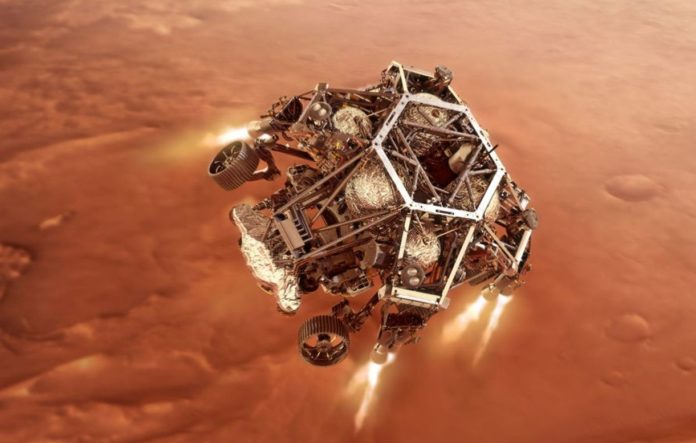NASA and other space agencies are planning to land humans on Mars, with SpaceX aiming for 2026.
Scientists fear that traveling to Red Planet will accelerate the aging process, making human missions to Mars risky.
To find out if such missions promote a deadly ageing process called cell senescence, researchers at the world-renowned Mayo Clinic will begin studying astronauts in February this year.
The researchers will collect blood and urine samples from four members of the first all-civilian crew to go to the International Space Station (ISS) in order to investigate if they can detect evidence of senescence in the early stages of life.
The International Space Station (ISS) is located within a protective magnetic bubble known as the Van Allen belt, which shelters the Earth from radiation. The crew will only be on board for a total of 10 days.
Travelers to Mars, on the other hand, would be without such protection, and they would be subjected to the circumstances for months or perhaps years. Previous research has indicated that astronauts who performed lunar missions were five times more likely to die from cardiovascular illness than those who conducted trips into low orbit, according to previous studies.
“This flight will give us an idea of whether routine spaceflight, without even going beyond the Van Allen belt, is associated with cell senescence,” said Dr James Kirkland, a Mayo Clinic expert on cellular ageing.
“If we see senescence even under these conditions, we would certainly want to do some work in preparation for a longer mission. Something will have to be worked out before or longer before interplanetary flights are really feasible.”
As individuals grow older, the cells in their bodies gradually transition into a condition of permanent torpor known as senescence. These ‘zombie cells,’ which are neither alive nor dead, hinder the body from replacing the non-functioning cells while simultaneously preventing them from being swept away.
Instead, they can release substances that cause the body to become more inflamed, increasing the likelihood of developing disease. Senescent cells play a crucial role in the development of children, clustering around the site of injuries to alert the immune system that there is damage that needs to be repaired.
Wounds heal significantly more slowly if they are not present. Although the zombie cells are swept away when they appear in those earlier years, as people grow older, their immune systems lose their ability to do so.
“You find senescence in conditions where cells are under stress, and they deform,” said Dr. Kirkland.
“Zero gravity results in changes in cell shape, and the high G-force when a rocket takes off could also conceivably contribute to DNA cellular senescence.
“Then there is radiation. The crew on the ISS will be inside the Van Allen belt but the real worry is what’s going to happen if there is a Mars mission, and if there is a solar flare, because then you’re dealing with atomic radiation.
“We’ve found in preliminary studies very low doses of atomic radiation can drive a cell into senescence at much lower levels than x-rays or gamma rays.
“And, with atomic radiation, it could pass right through the spacecraft: it’s hard to stop. So if there’s a Mars mission this could really be a major problem.
“I’m a physician, not a space scientist, so my view is biased, but I’d say the health problem is pretty darn bad, and I’m very worried after what I’ve seen.”
The Axiom 1 commercial space company is in charge of the ISS trip, while SpaceX will be responsible for the astronauts’ launch into orbit. The mission commander will be Michael López-Alegra, a former Nasa astronaut and Vice President of Axiom Space who will act as the mission’s co-pilot and flight director.
Captain Larry Connor will be in charge of the mission’s piloting. Mission Specialists Mark Pathy and Eytan Stibbe will be flying to the station in the coming days.
It is also planned for the crew to take up several kinds of human cells that are in a pre-senescent state and place them in special incubators to test if the circumstances on the International Space Station cause them to enter an early dormancy state.
“The cells are on the verge of senescence, and we want to see if zero gravity, plus G forces and a high carbon dioxide atmosphere in the capsule plus the radiation will drive human cultured cells that are pre-senescent into a state of senescence. We’ll have similar control cells back on Earth.”
If the team does find out that spaceflight makes cells age, there may be a way out. There are now 15 clinical trials underway for medications known as senolytics, which are believed to be effective in combating the process.
Evidence from early studies suggests that they can enhance physical function in persons who are suffering from deadly diseases induced by cell senescence, such as lung disease. Idiopathic pulmonary fibrosis is the focus of the research, although other diseases such as Alzheimer’s disease, diabetes, frailty, and osteoarthritis are also being investigated.
The medications may even be employed in donor organs to “turn back the clock” before they are transplanted into younger people, if the research proves successful.
“We will need to develop these or other drugs that target fundamental ageing processes to see if we can mitigate the damage before we go to Mars,” Dr. Kirkland said. “I am touching wood that these drugs will work.”
Image Credit: Getty
You were reading: Scientists fear trip to Red Planet may expose Travelers to cell senescence, leading to early death
